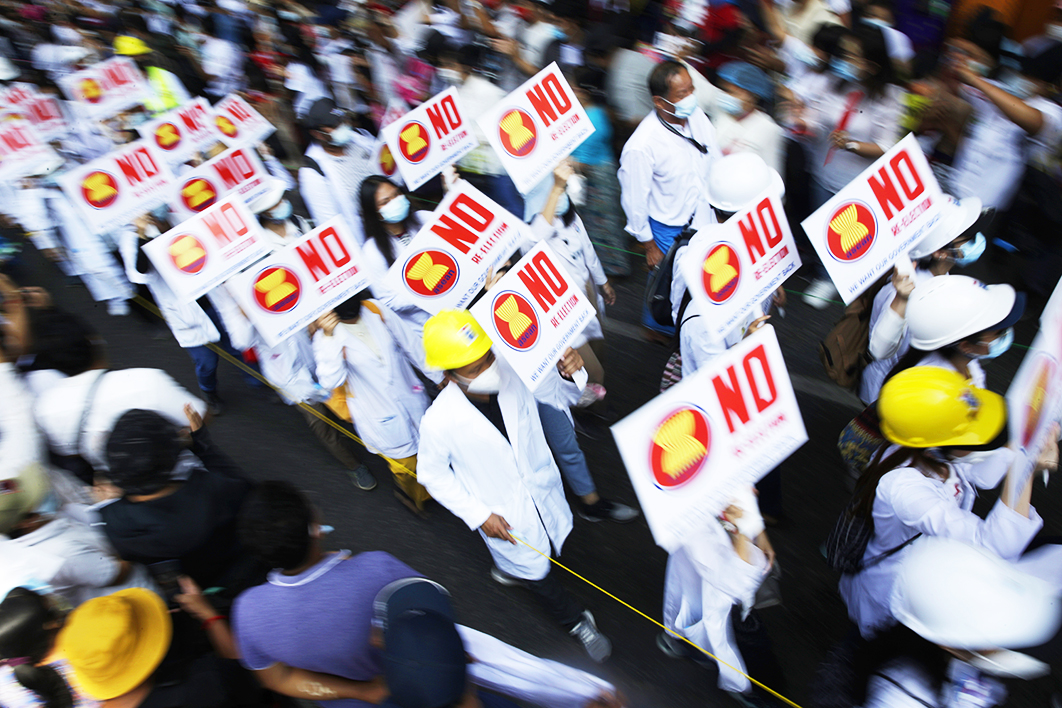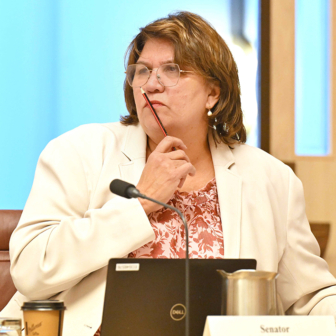During 2014, researching in Myanmar, I spent as much time as possible in the vast legislative complex in the capital, Naypyitaw. Built on an incredible scale, it is designed to awe visitors and reinforce the city’s role as the centre of a great and longstanding civilisation. The military imposed that vision on the country, but other perspectives were being encouraged, often warmly, to play a role in the city’s new political institutions.
Back then, Aung San Suu Kyi and dozens of her National League for Democracy counterparts filled seats in the three cavernous chambers of Myanmar’s Hluttaw, the local expression of semi-democratic will. Like so many other parts of the capital, the legislature is hardly pedestrian-friendly, so it made sense to ride around in a car or other vehicle, especially on a hot day. It was clear that the city’s bridges and intersections were built so that a well-prepared army could, on a whim, retake absolute control. And we knew that the NLD was only in Naypyitaw because the military had made space for it.
But that was only part of the story. The more important point was that the Myanmar people voted with tremendous enthusiasm for NLD candidates and the promise of a democratic tomorrow. In 2012 at a crucial by-election, in 2015 at the general election, and in 2020 at the most recent national poll, the NLD proved unassailable. But the power-sharing system also meant that each time the NLD scored a win, the military’s appointed 25 per cent of legislators were there, watching and waiting.
The soldiers needed the legitimacy of elections for their claims to a permanent role under the 2008 constitution. On their orders, part of the compromise that followed Aung San Suu Kyi’s release from house arrest in 2010 was a series of carefully calibrated steps that helped to gradually, but never comprehensively, rehabilitate a lacklustre national reputation. It was clear that the military would never surrender its constitutional handbrakes, nor its claim to the unelected quota in Myanmar’s national and regional parliaments.
In practice, the military also invested enormously in the success, or perceived success, of this ambitious legislative apparatus. During every legislative session the top commanders allocated hundreds of officers, on a rotating basis, to the often mind-numbing task of keeping an eye on the political and economic debate. Contrary to some claims, these captains, majors and colonels, along with the occasional brigadier, would also take the floor from time to time, offering their contributions to the debate.
The tone of that involvement was often paternalistic, implying that the country’s success rests on military stewardship. Indoctrination from the military commissioning schools, especially the vaunted Defence Services Academy outside Mandalay, appeared to reinforce a strict allegiance to a narrow set of nationalist precepts. But the military was one voice among many in the legislatures and the other new political institutions. Soldiers needed to sit, often for hours, through the back-and-forth on all manner of cultural and technical topics. The management of what they called “discipline-flourishing democracy” was always a game of patience.
Engaged in that game from 2011 to 2016, members of the military worked closely with their civilianised offsiders in the Union Solidarity and Development Party. With retired generals U Shwe Mann and U Khin Aung Myint running the two houses of assembly, there were only occasional tensions.
The grand compromises implied by the military’s handcrafted constitution required everyone to accept the status and space of their opponents. Like so much else, the unspoken divide-and-rule agenda of the army made it possible for even the Rohingya to find some elected space in the legislatures, at both national and state levels.
When the NLD took more power from 2016 it acted in ways that helped dampen some of these more inclusive tendencies. It was clear to Aung San Suu Kyi’s strategists that the military’s anti-Rohingya campaigns were popular and that a sure-footed alignment with chauvinist perspectives would win votes. Journalists and freethinkers were still vulnerable; Myanmar under the NLD was hardly a bastion of free expression or liberal virtue. Indeed, the common ground between militarist and elected interests helped to forge a loose coalition that lasted right up to the coup.
Since the coup, many protesters appear to have looked afresh at recent political history, including the abysmal treatment of the Rohingya. For so long a friendless group, cast adrift even by Myanmar’s progressives, they are now, we learn, considered an ally in the struggle against military power. Statements of apology for the hostility among Myanmar’s Buddhists are flowing. A reckoning with the dark side of the country’s politics is under way.
Now, having moved so decisively against the elected leadership, the coup-makers have ended the détente created by the 2008 constitution. And the violence being unleashed against the nationwide protests also shows how deeply fearful the military remain. Rather than bearing the hallmarks of an effective political or combat machine, their tactics reflect an organisation that has a deep reluctance to engage beyond its ranks or its own self-serving judgements.
After decades of economic and political primacy, the fact is that the military’s tentacles are strong and expansive. Its hundreds of garrisons around the country are a constant reminder that internal security is the essential feature of Myanmar military culture. Its own museum — a monumental complex on the outskirts of Naypyitaw — and its incessant propaganda trumpet dubious counterinsurgency successes, but the army’s defining role has been the management of dissent through a stranglehold on the political process.
Very few Myanmar people ever got to see the legislatures up close. Protected by high fences, platoons of Special Branch police and plenty of surveillance, Naypyidaw’s parliamentary precinct was designed to be unwelcoming. Each day delegations of hand-picked party members, ethnic leaders, ambassadors, visiting business chiefs and other assorted dignitaries were escorted inside the fortifications. Yet very little interaction with military legislators was ever encouraged.
So nobody can say with great confidence what the obligatory 25 per cent of military MPs have taken from their months or years sitting in their designated rows, drinking in the pomp and protocol of legislative action. Do they feel a democratic system has any future? Are they comfortable continuing to define the national agenda on the military’s terms? Have they decided that all the politicking and horse-trading and electioneering was a grand waste of time?
What we do know is that the coup has abruptly ended a round of flirtation with more inclusive political practices. It does not help that the military has appeared impervious to criticism for so long, and has been determined, menacingly, to conduct itself on its own narrow strategic terms. Brief moments of relative openness have been greeted warmly, which makes sense, and yet those deviations from the disciplining mindset have been all too rare.
So what happens to the army now? It seems doubtful that elected representatives from genuinely competitive contests would ever willingly sit side-by-side with unelected military personnel. Some civilian leaders, including from key ethnic groups, have already been co-opted to serve the new regime, but the notable names tend to be opportunists and pragmatists. We cannot assume they have any common cause with those they notionally serve.
The calculation from Myanmar’s senior general, Min Aung Hlaing, and his top subordinates is that the army can remain the primary institution for creating political change. But they have already misjudged the people’s mood and appear to have an inflated sense of how well they understand the political and geostrategic landscape. We learned when they sat in the Hluttaw that Myanmar military officers will follow orders, turn up on time, and monitor what others are doing and saying. These are valuable attributes for junior intelligence officers.
The Hluttaw officers are not, on the other hand, a realistic model of national leadership during a pandemic or at a moment of economic and political crisis. In a country jammed between China and India, with tens of millions of devices connected by the internet, and a rising generation of creative, courageous and enraged activists prepared to risk life and limb, the military clearly doesn’t offer the leadership the people want.
Myanmar’s military has bet its future on its permanent ability to terrorise a long-downtrodden people. But images from Naypyitaw show that even in the army’s self-contained stronghold waves of peaceful protests keep coming, one after the other. It seems doubtful that everyone in the army’s ranks feels they are on the right side. •




